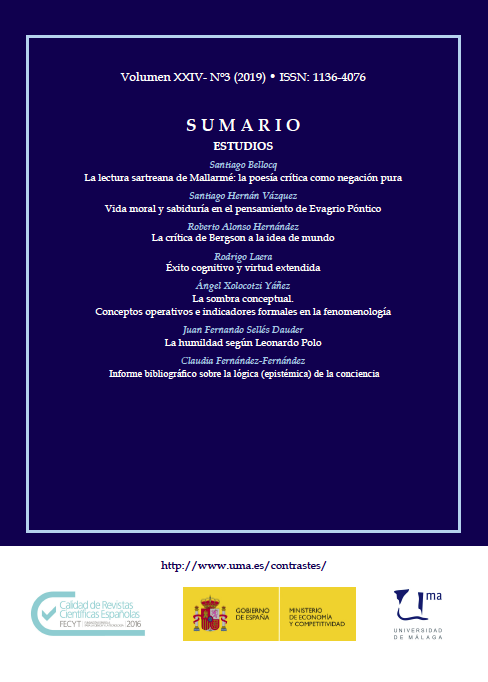Cognitive Success and Extended Virtue
DOI:
https://doi.org/10.24310/Contrastescontrastes.v24i3.7552Keywords:
extended mind, epistemic virtue, cognitive success, externalism,Abstract
The aim of this paper is to present the idea of virtue extended under three fundamental aspects of cognitive success (i) the dynamic nature of the collection and evaluation of evidence; (ii) the reliability of the prediction processes; (iii) the ability to deal with a given context, where extended capabilities are integrated with non-extended ones. In this sense, cognitive success is the product of a function between the collection of evidence and its cost in time and effort. The extended virtue is intended to reduce said cost.
Downloads
Metrics
Publication Facts
Reviewer profiles N/A
Author statements
Indexed in
-
—
- Academic society
- N/A
- Publisher
- Universidad de Málaga
References
ADAM, F. & AIZAWA, K., 2008. The bounds of cognition. Oxford: Blackwell.
BURDMAN, F «El post-cognitivismo en cuestión: extensión, corporización y enactivismo». Principia 19(3), pp. 475–495.
BURGE, T., 1986. «Individualism and psychology». The Philosophical Review, 95(1), pp. 3-45.
CLARK, A., 2015. What ‘extended me’knows». Synthese, 192(11), pp. 3757-3775.
CLARK, A. & CHALMERS, D., 1998. «The extended mind». Analysis, 58(1), pp. 7-19.
GOLDMAN, A., 2010. «Why social epistemology is real epistemology». En: A. Haddock, ed. Social Epistemology. Oxford: Oxford University Press, pp. 1-28.
GRECO, J., 2002. «Virtues in epistemology». En: P. K. Moser, ed. The Oxford handbook of epistemology. Oxford: Oxford University Press, pp. 287-315.
KVANVIG, J., 1992. The intellectual virtues and the life of the mind: On the place of the virtues in contemporary epistemology. Savage: Rowman & Littlefield.
MENARY, R., 2007. Cognitive integration: Mind and cognition unbounded. London: Palgrave Macmillan.
PRITCHARD, D., 2010. «Cognitive ability and the extended cognition thesis». Synthese, 175(1), pp. 133-151.
PRITCHARD, D. & PALERMOS, S., 2013. «Extended knowledge and social epistemology». Social Epistemology Review and Reply Collective, Volumen 8, pp. 105-120.
PUTNAM, H., 1975. «The Meaning of ‘Meaning’». Language, mind, and knowledge. Minnesota studies in the philosophy of science, Volumen 7, pp. 131- 193.
RUPERT, R., 2009. Cognitive Systems and the Extended Mind. Oxford: Oxford University Press.
RUPERT, R., 2010. «Extended cognition and the priority of cognitive systems». Cognitive Systems Research, 11(4), pp. 343-356.
SOSA, E., 1991. Knowledge in Perspective: Selected Essays in Epistemology. Cambridge: Cambridge University Press.
SOSA, E., 2007. A Virtue Epistemology: Apt Belief and Reflective Knowledge, Vol. I. New York: Oxford University Press.
SPREVAK, M., 2009. «Extended cognition and functionalism». The Journal of Philosophy, 106(9), pp. 503-527.
STERELNY, K., 2010. «Minds: extended or scaffolded?» Phenomenology and the Cognitive Sciences, 9(4), p. 465–481.
Downloads
Published
How to Cite
Issue
Section
License
This journal provides immediate free access to its content under the principle of making research freely available to the public. All content published in Contrastes. Revista Internacional de Filosofía, are subject to the Creative Commons Attribution-NonCommercial-ShareAlike 4.0 license whose full text can be found at <http://creativecommons.org/licenses/by-nc-sa/4.0>
It is the responsibility of the authors to obtain the necessary permissions of the images that are subject to copyright.
Authors whose contributions are accepted for publication in this journal will retain the non-exclusive right to use their contributions for academic, research and educational purposes, including self-archiving or repository in open access repositories of any kind.
The electronic edition of this magazine is edited by the Editorial Service of the University of Malaga (Uma Editorial), being necessary to cite the origin in any partial or total reproduction.










5.png)
